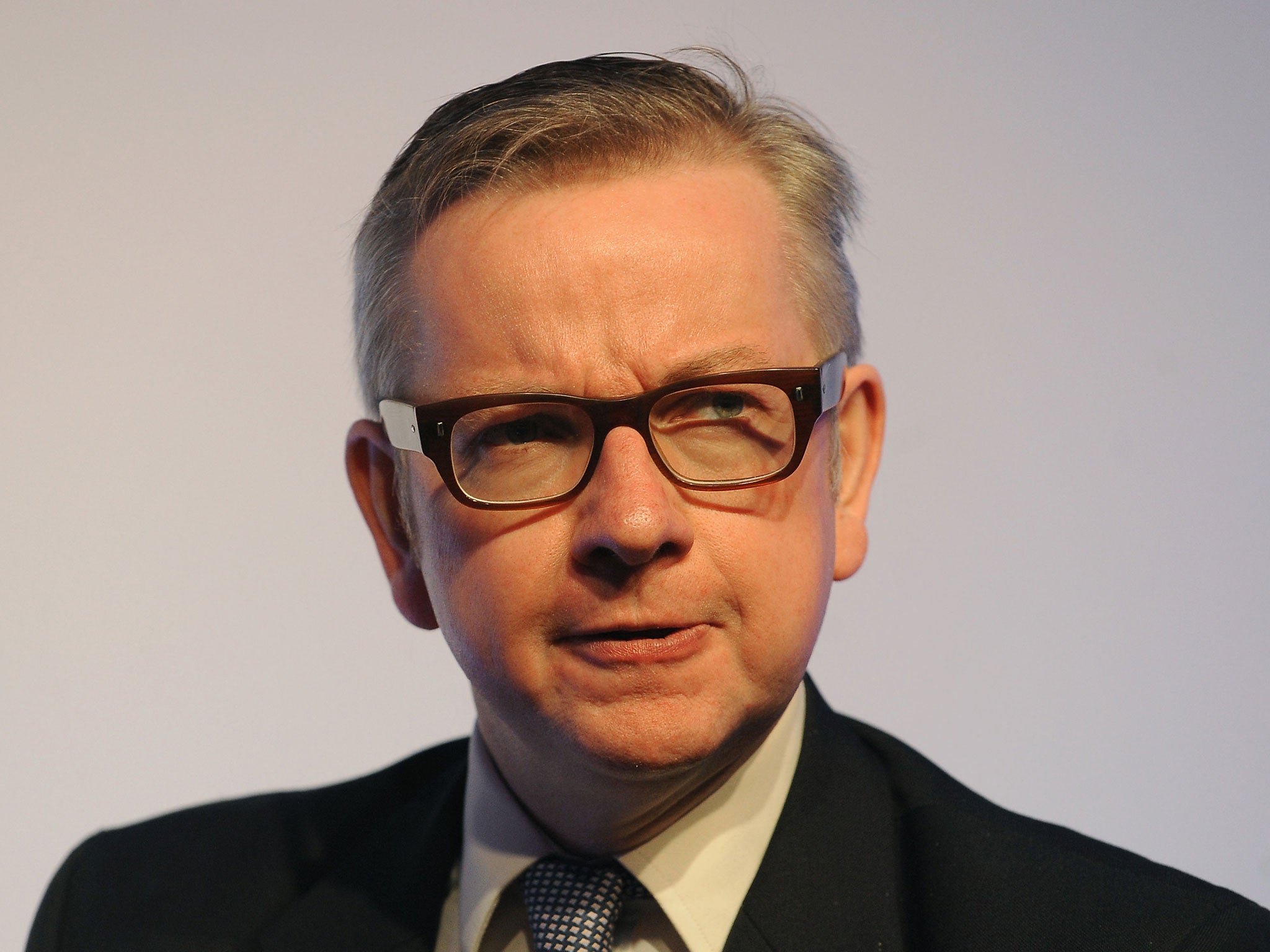Michael Gove doesn't really want to bring back hanging – unlike his predecessor, he's not a monster
The former Education Minister claims to be a 'liberal' on criminal justice: let’s hope so

The new Justice Secretary will be briefing his mandarins about now, and one item almost certainly not on Michael Gove’s agenda is the return of public hanging. Perhaps nobody seriously thinks it is. That, all the same, has not stopped a perpetually fermenting section of social media taking excerpts from a Times column Gove wrote in 1998 – headlined “Bring back the Noose” – and sharing them in a tremor, as if all the new Justice Secretary plans to do in office is refit a gallows, march his enemies to it and tie the hangman’s knot himself.
Neither the column itself, nor the nature of the man who wrote it, need provoke such paranoia. Quite the opposite. The key words in the piece are not the more sensational ones highlighted on Twitter, but to be found in the second sentence, where Gove declares himself a “liberal on criminal justice”. The rest simply shows that, like an intellectual gymnast, Gove can happily bend an argument, and quite a good one, around a liberal taboo. I came to the end no less convinced – as I’d guess Gove secretly was even then – that hanging criminals is a travesty, but buoyed in the belief that he could make a good Justice Secretary.
At the least, he seems to care deeply about the principles of British justice, and has thought about them. That is more than can be said for his predecessor, Chris Grayling, whose performance during his two-and-half years in the job took the worst fears about the Tory party – a dismissal of the vulnerable, senseless cutting, free-market dogma above all – and bullishly put them into practice. If David Cameron is seriously going to try and make the phrase “Compassionate Conservative” less of an oxymoron, and his recent speeches give that impression (“one nation” and “fairness” making a return) then the Justice Department will need an almighty change of tack.
As Education Secretary Michael Gove’s own sense of injustice propelled him into costly and, in terms of his own position, ultimately fatal conflict with the teaching unions. He was furious about the condition of state schools. He ought to be equally angry about the state of British prisons. They are overcrowded places, increasingly dangerous, and largely devoid of any meaningful attempt at rehabilitation. Of course, prisoners cannot vote. They have almost no voice in public life. But to pursue Grayling’s methods – stripping away books being only the most memorable idiocy – would shame anyone who professes to have a liberal bone in their body.
Happily, Gove is said to be ready to apply some of that reformist zeal here. He must bring the number of prisoners down, and has enough credit with the Tory right that he should be able to do so without too much gnashing on the backbenches. For one, it would bring down costs, which is a case Gove – liberal by some lights, neocon by others – will surely make to them.
On the subject of the Human Rights Act, Gove should use his chameleonic qualities again. He has been brought in to scrap it, to provide some red meat to those same backbenchers who loathe the least whiff of Europe. So long as he manages to fudge things a bit, to keep Britain signed up to the European Convention on Human Rights (EHCR), while getting rid of the few glaring restrictions, a British Bill of Rights could satisfy those who want strong human rights law as well as appease the Tory extreme. Tricky, but let’s wait and see.
A touch of liberalism is called for in spending terms, too, if Gove has any ambition to be seen as “compassionate” by the end of his term. It is too late to do much about the botched outsourcing of probation, and with cuts of 17.9 per cent forecast for the Justice Department budget in the next parliament, there is not much money to feather a reformist’s pillow. Here, Gove should point out two things. First, Grayling’s slashing of legal aid was so dramatic it actually dropped £500m off the £2bn budget years ahead of schedule, so there is no rush.
Second, such was the ferocity of the slashing, a series of uneconomic wounds are bleeding. Denied legal aid, many have decided to represent themselves in court – leading to long and costly delays. Slow the axe, Gove should say, and we may not only benefit the Treasury, but stop the lawyers striking for a third time – and, longer term, convince those trainees considering criminal law not to give it up. I know at least two who fear that paying rent and pursuing that career are shortly to become incompatible.
Of course, Gove has a penchant for taking on “blobs”, as he refers to professional opinions that diverge from his, and may block his ears to the irate barristers. It did not work well for him the first time, and even though there are fewer lawyers than teachers ready to protest, and public sentiment shies away from anyone in a gown and wig, their case is arguably clearer.
Justice is becoming a good for the wealthy. The poor – in prisons and in court – find the system increasingly set against them. A liberal should be appalled. How much of a “liberal on criminal justice” Gove remains, we are about to find out.
Join our commenting forum
Join thought-provoking conversations, follow other Independent readers and see their replies
Comments